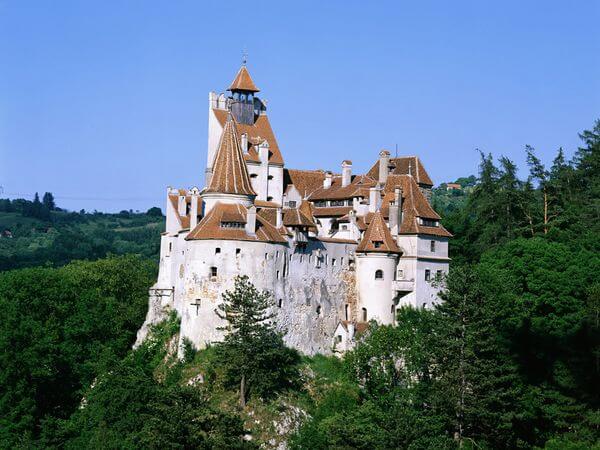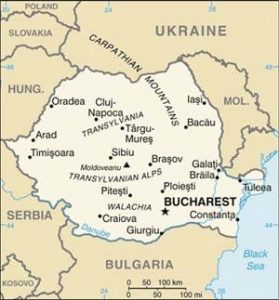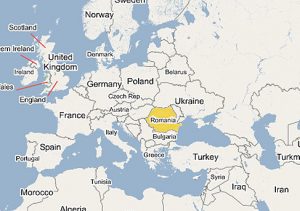Romania History and Culture – Nation in SE Europe bounded by Hungary and Serbia on the W, Bulgaria on the S, Moldova and the Ukraine on the N, and the Black Sea on the E. Modern Romania comprises roughly what was once the ancient region of Dacia, which under that name was a province of Rome in the first and second centuries a.d. The modern name Romania means “land of the Romans.” Latin-speaking Roman colonists provided the foundation for the Romanian language, a Romance tongue. After the Romans departed in a.d. 270, the region was invaded by a succession of peoples: the Visigoths in the fourth century; the Huns who soon pushed the Goths farther into Europe; the Avars, nomads who plundered the Balkan Peninsula in the sixth century; the Bulgars in the next century; and the Magyars in the late ninth century, who were then forced farther on to settle Hungary. The Mongols (see Mongol Empires) ruled the region in the 13th century, and after that the history of Romania is chiefly that of the principalities of Moldavia and Walachia and of Transylvania.
Moldavia, in the northwest, was a strong state that at its height in the 15th century included Bukovina and Bessarabia. By 1504, however, the Ottoman Empire had made Moldavia a tributary state. Walachia in the south suffered much the same fate. Its ruler Vlad the Impaler, also called Dracula, or son of the Devil, was defeated and killed by the Ottomans in 1476. In Transylvania, in northwest and central Romania, the rulers were also under Turkish suzerainty. Michael the Brave, prince of Walachia, fought both the Ottomans and the Holy Roman Empire successfully and controlled all three regions by 1600. However, after his death the next year, the Turks resumed control of Moldavia and Walachia, and Austria took Transylvania.
In the late 18th and early 19th centuries Russia and Turkey fought over Moldavia and Walachia. After the Russo-Turkish War of 1828–29 both remained officially under Turkish control but actually were protectorates of Russia. Following the Crimean War, the Congress of Paris in 1856 recognized the two states as quasi-independent and awarded southern Bessarabia to Moldavia. In 1859 both principalities elected the same prince, Alexand er John Cuza. On December 23, 1861, the two states merged and formed the nation of Romania, with Bucharest as the capital. Romania joined Russia in war against Turkey in 1877 and at the Congress of Berlin in 1878 was recognized as fully independent. However, Romania had to cede Bessarabia to Russia, receiving the Dobruja, a historic region in southeastern Romania and northeastern Bulgaria, in return. At this time the kingdom was mostly in turmoil, the result of corruption in government, lack of land reform, and violent anti-Semitism. As a result of the Second Balkan War in 1913, Romania gained some territory from Bulgaria.
In World War I Romania remained neutral until 1916, when it joined the Allies. It was, however, overrun by Austrian and German forces and in 1918 was forced to submit to harsh peace terms. Allied victory in November changed the situation, and the treaties of Saint-Germain in 1919 and the Grand Trianon in 1920 gave Romania Transylvania, Bukovina, and part of the Banat in western Romania; but Russia refused to recognize the seizure of Bessarabia. For protection against Bulgaria’s and Hungary’s desire to get back certain territory, Romania joined the Little Entente with Czechoslovakia and Yugoslavia in 1920 and the Balkan Entente in 1934 with Yugoslavia, Greece, and Turkey. In the late 1920s and 1930s, there was dissension over the succession to the throne, tense controversy between political parties, and frequent changes of government. The Iron Guard, a fascist organization formed in 1927, became increasingly powerful. In his contest with it, King Carol II in 1938 established a royal dictatorship. At the start of World War II Romania remained neutral, but in 1940 it was powerless to resist the Soviet demand for Bessarabia and northern Bukovina or Bulgarian and Hungarian demand s for southern Dobruja, the Banat, and part of Transylvania.
In June 1941 Romania joined Germany in war on the USSR, only to suffer defeat. King Michael then overthrew the fascist regime, surrendered to the USSR, and joined the Allies. By a 1947 treaty Romania recovered all its territory except Bessarabia, northern Bukovina, and southern Dobruja. A communist-dominated government took office in 1945, forced Michael to abdicate in December 1947, and proclaimed Romania a people’s republic. The nation became closely attached to the USSR, joining the Council of Mutual Economic Assistance in 1949 and the Warsaw Pact Treaty Organization when it was formed in 1955. However, Romania became more independent of the USSR in foreign policy after 1963, especially under Nicolas Ceausescu, who has been the head of the communist regime since 1967. It maintained diplomatic relations with China and Albania and with Israel. It has also criticized the Soviet invasion of Afghanistan and made friendly diplomatic and cultural gestures toward the United States.
Treatment of dissidents at home, however, remained harsh. In 1989, as other nations in Eastern Europe began to break free of Communist governments, antigovernment violence broke out in Timisoara and spread to other cities. The army joined the uprising, and Ceausescu was captured and executed along with his wife. A provisional government was established, with Ion Iliescu, a former Communist, as president. In 1990, Iliescu won the presidency and his party, the National Salvation Front, obtained a large majority in the legislature. Iliescu was reelected in 1992, but was defeated by Emil Constantinescu of the Democratic Convention Party in 1996. Economic reform was slow through the 1990s and the economy struggled. In the 2000 elections, Iliescu was elected back to the presidency. In 2003, Romania approved constitutional changes protecting the rights of ethnic minorities and property owners as a precursor to applying for membership in the European Union. Romania joined NATO in 2004, in that year’s elections, center-right opposition cand idate Traian Basescu won the presidency.








Can I just say what a relief to find someone who actually knows what theyre talking about on the internet. You definitely know how to bring an issue to light and make it important. More people need to read this and understand this side of the story. I cant believe youre not more popular because you definitely have the gift.